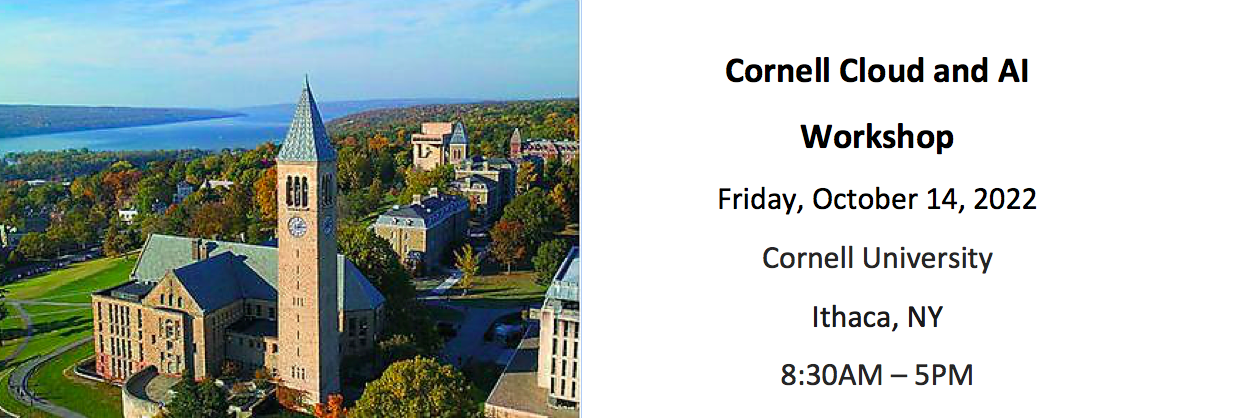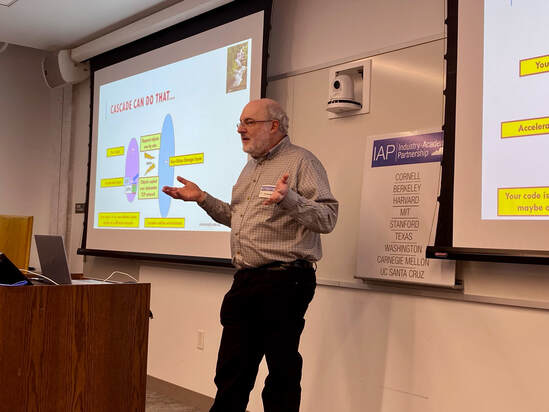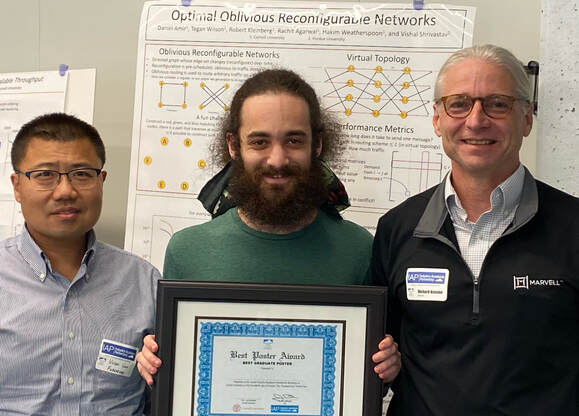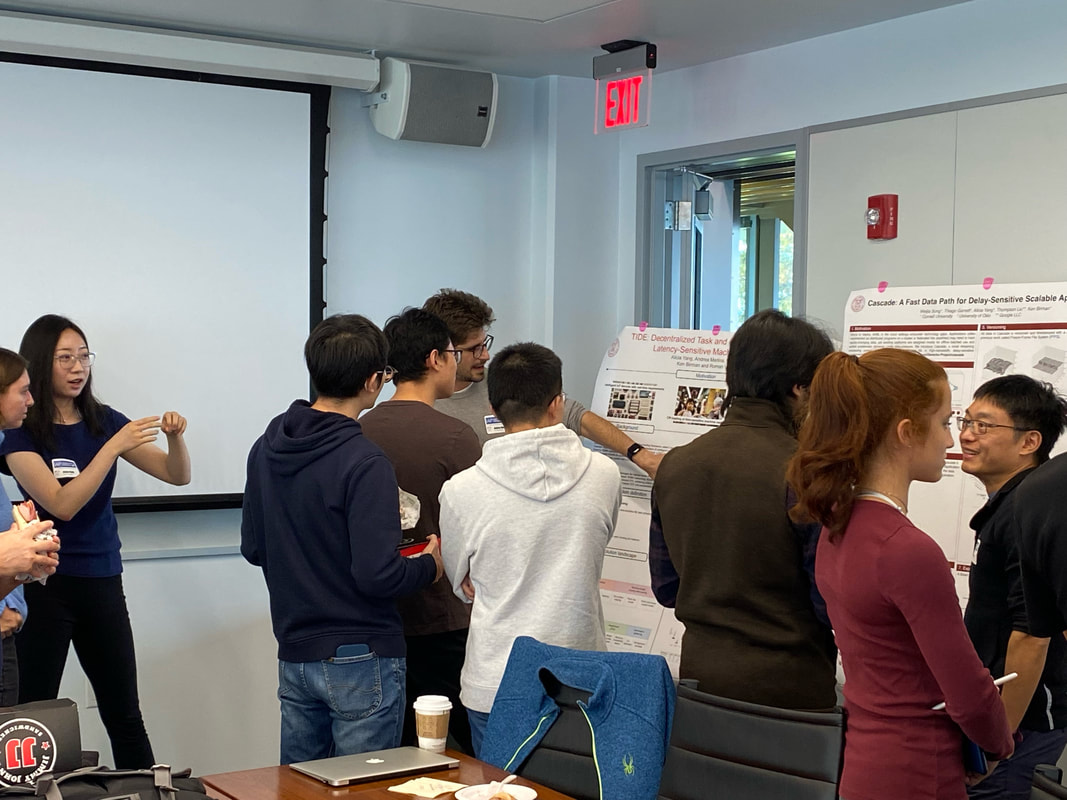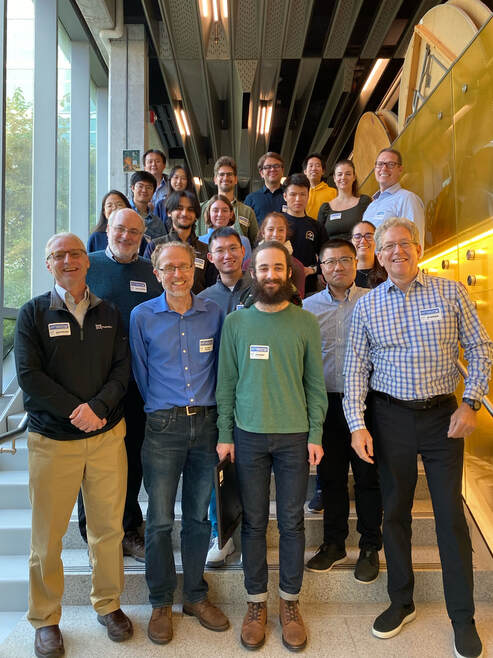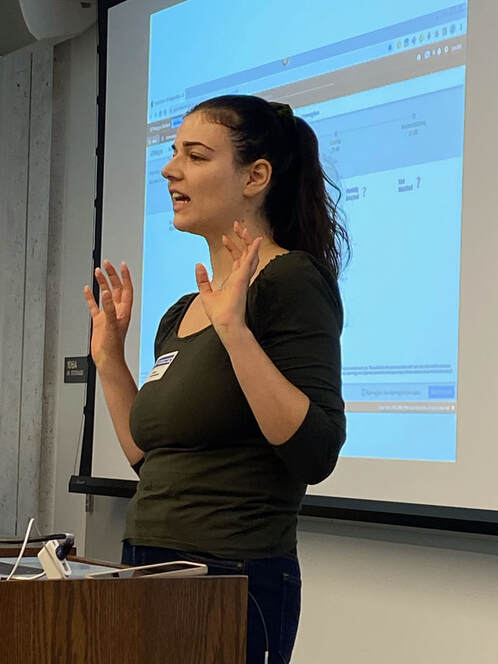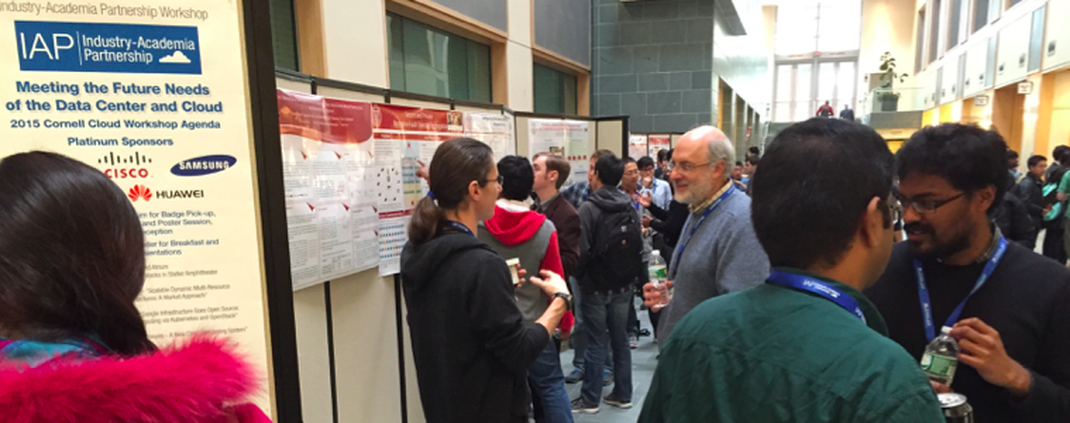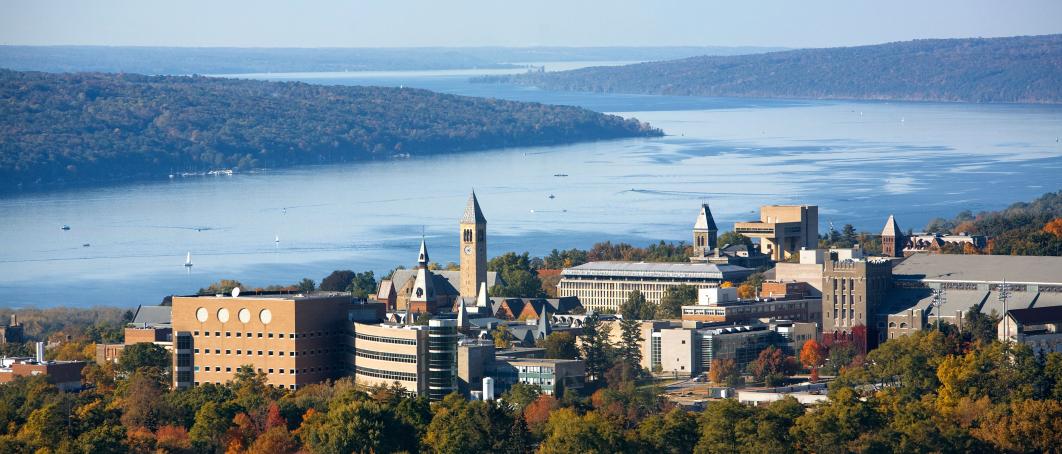The IAP Cornell Workshop on the Future of AI and Cloud Computing was conducted on Friday, October 14, 2022 in Upson Hall on the Cornell campus in Ithaca, NY.
This event was co-organized by Professor José Martínez and the IAP.
This event was co-organized by Professor José Martínez and the IAP.
|
Ken Birman, the N. Rama Rao Professor of Computer Science at Cornell University, kicks off the Workshop with his talk, “Cascade: An Edge Computing Platform for Real-time Machine Intelligence.”
|
Computer Science PhD student Daniel Amir won the Best Poster Award for his research "Optimal Oblivious Reconfigurable Networks." Victor Cao (Futurewei) and Rick Kessler (Marvell) congratulate Daniel.
|
Several outstanding research posters were presented during the Lightning Talk session and Poster Session over the lunch hour by PhD students in ECE and CS. Two posters are shown in the photo above.
|
Agenda - Videos of Presentations
8:30-8:55 – Badge Pick-up – Coffee/Tea and Breakfast Food/Snacks
8:55-9:00 – Welcome – Prof. José Martínez
9:00-9:30 – Prof. Ken Birman, Cornell, “Cascade: An Edge Computing Platform for Real-time Machine Intelligence”
9:30-10:00 – Dr. Richard E. Kessler, CTO Security & Advanced Technology, Marvell, “Machine Learning for Networking”
10:00-10:30 – Prof. Robbert van Renesse, Cornell, “Exotanium: A Cloud Hypervisor and Cloud Cost Optimization Engine for Cloud Users”
10:30-11:00 – Dr. Jian Li, Senior Director of Research and Technology Planning, Futurewei, “Case Studies of Information and Communication Technologies Platform Research and Technology Planning”
11-11:30 – Lightning Round for Student Posters
11:30-12:30 – Lunch and Poster Viewing
12:30-1:00 – Prof. Carla Gomes, Cornell, "Computational Sustainability: AI for a Better World and a Sustainable Future - AI for Accelerating Scientific Discovery"
1:00-1:30 – Prof. José Martínez, “PIMCloud - QoS-Aware Resource Management of Latency-Critical Applications in Clouds with Processing-in-Memory”
1:30-2:00 – Prof. Nate Foster, Cornell, “New Foundations for Networks”
2:00-2:30 – Dr. Jiaqi Gao, Senior Software Engineer, Network Research Group, Alibaba, “Alibaba's Compiler System for Programmable Data Plane Networks”
2:30-3:00 – Break
3:00-3:30 – Dr. Serdar Tasiran, Principal Applied Scientist, Amazon Web Services, “Formal Methods for Distributed Systems at Amazon Web Services (AWS)”
3:30-4:00 – Prof. Francesca Parise, Cornell, "Distributed Computation for Large-Scale Multi-Agent Systems: Where Artificial Intelligence Meets Game Theory"
4:00-4:30 – Dr. Antigoni Polychroniadou, Cryptography Research Lead (Vice President), JP Morgan Chase, "Prime Match: A Privacy Preserving Inventory Matching System"
4:30-5:00 - Best Poster Award & Reception
Abstracts and Bios
Ken Birman, Cornell, “Cascade: An Edge Computing Platform for Real-time Machine Intelligence”
Abstract: Cascade is an open-source distributed computing platform to host AI or ML software close to cameras, other sensors and actuators in settings where it is important to obtain ultra-low latencies and very high data rates, but where fault-tolerance and strong consistency are also needed. The computing model focuses on ML pipelines, cooperative graphical structures with multiple independently-created MLs that jointly solve problems and distributed AI solutions that obtain parallelism by running on multiple nodes. While supporting standard ML and AI platforms unchanged, Cascade also offers a fast path that maps data movement and computing to accelerators such as RDMA, NMVe memory and GPU. Cascade is up and running, and our team would welcome potential users and research collaborators from the IAP community.
Bio: Ken Birman is the N. Rama Rao Professor of Computer Science at Cornell University. His work seeks a balance between protocols with strong guarantees and practical utility/efficiency. His earliest distributed systems work included the Isis Toolkit, which introduced the virtual synchrony membership management model and implemented one of the first Paxos protocols to gain wide acceptance. Isis plays many roles in the French air traffic control system (active without a single outage since 1995), and was also used in the New York Stock Exchange trading floor, the Swiss Stock Exchange, and many other critical systems. Later work explored gossip protocols and reliability and consistency in cloud computing infrastructures. Ken is a Fellow of the ACM and IEEE, received the IEEE Kanai Award and the IEEE TCDP Award for contributions to distributed computing, and was recognized with a Cisco “computing visionary” award. Ken’s website is http://www.cs.cornell.edu/ken.
Nate Foster, Cornell, “New Foundations for Networks”
Abstract: Software-defined networking (SDN) is often explained as a shift of who is in control. SDN empowers network owners to implement new functionality directly, rather than having to wait for equipment vendors and standards bodies. But there is another important -- and often overlooked -- aspect of SDN: it offers an exciting opportunity to develop new foundations for networking based on solid mathematical principles. This talk will discuss opportunities and challenges in the area of network verification, ranging from the design of expressive modeling languages, to approaches for specifying correct behavior, to scalable property-checking tools.
Bio: Nate Foster is a Professor of Computer Science at Cornell University and a Platform Architect at Intel. The goal of his research is to develop languages and tools that make it easy for programmers to build secure and reliable systems. He received a PhD in Computer Science from the University of Pennsylvania, an MPhil in History and Philosophy of Science from Cambridge University, and a BA in Computer Science from Williams College. His awards include a Sloan Research Fellowship, an NSF CAREER Award, the SIGCOMM Rising Star Award, and paper awards from POPL, NSDI, SIGCOMM, CoNEXT, and ICFP.
Jiaqi Gao, Alibaba, “Alibaba's Compiler System for Programmable Data Plane Networks”
Abstract: Alibaba is one of the first companies that embrace programmable switches in their production network. Programmable switches allow the cloud providers to customize the data plane's behavior and also enable new chances to accelerate network applications. However, such flexibility brings new challenge: how to develop data plane program efficiently, correctly, and fully exploit all available data plane resources. In this talk, we introduce the compiler system we built for programmable data plane networks. This work was published in SIGCOMM'20 and NSDI'22.
Bio: Jiaqi Gao is a researcher/senior software engineer at Alibaba Network Research Group. He got his Ph.D. from Harvard University. His research interests are network applications and compiler for programmable devices.
Carla Gomes, Cornell, “Computational Sustainability: Computing for a Better World and a Sustainable Future - AI for Accelerating Scientific Discovery”
Abstract: Artificial Intelligence (AI) is a rapidly advancing field. Novel machine learning methods combined with reasoning and search techniques have led us to reach new milestones: from computer vision, machine translation, and Go world-champion level play, to self-driving cars. These ever-expanding AI capabilities open new exciting avenues for advances in new domains. I will discuss our AI research for advancing scientific discovery for a sustainable future. In particular, I will talk about our research in a new interdisciplinary field, Computational Sustainability, which has the overarching goal of developing computational models and methods to help manage the balance between environmental, economic, and societal needs for a sustainable future. I will provide examples of computational sustainability problems, ranging from biodiversity conservation, to multi-criteria strategic planning for Reducing adverse impacts of Amazon hydropower expansion, which appeared recently in Science (2022). This work was also featured in the Communications of ACM, in a cover article entitled Computational sustainability: computing for a better world and a sustainable future. I will also talk about our work on AI for accelerating the discovery for new solar fuels materials, which was featured in Nature Machine Intelligence, in a cover article entitled, Automating crystal-structure phase mapping by combining deep learning with constraint reasoning. In this work, we propose an approach called Deep Reasoning Networks (DRNets), which requires only modest amounts of (unlabeled) data, in sharp contrast to standard deep learning approaches. DRNets reach super-human performance for crystal-structure phase mapping, a core, long-standing challenge in materials science, enabling the discovery of solar-fuels materials. DRNets provide a general framework for integrating deep learning and reasoning for tackling challenging problems. For an intuitive demonstration of our approach, using a simpler domain, we also solve variants of the Sudoku problem. The article DRNets can solve Sudoku, speed scientific discovery, provides a perspective for a general audience about DRNets. Finally, I will highlight cross-cutting computational themes and challenges for AI at the intersection of constraint reasoning and deep learning.
Bio: Carla Gomes is the Ronald C. and Antonia V. Nielsen Professor of Computing and Information Science and the founding director of the Institute for Computational Sustainability at Cornell University. Gomes received a Ph.D. in computer science from the University of Edinburgh. Her research area is Artificial Intelligence with a focus on large-scale constraint reasoning, optimization, and machine learning. Gomes provided the vision for and helped found the field of Computational Sustainability. Gomes has led two large-scale NSF Expeditions in AI and Computational Sustainability. Gomes was named the “most influential Cornell professor” by a Merrill Presidential Scholar (2020). Among other awards, Gomes is the recipient of the 2021 AAAI Feigenbaum Prize for establishing and nurturing the field of computational sustainability and for foundational contributions to artificial intelligence, and of the 2022 ACM/AAAI Allen Newell Award, for contributions bridging computer science and other disciplines. Gomes is a Fellow of the Assoc. for the Advancement of AI (AAAI), Fellow of the Assoc. for Computing Machinery (ACM), and Fellow of the American Assoc. for the Advancement of Science (AAAS).
Richard E. Kessler, Marvell, “Machine Learning for Networking”
Abstract: AI-ML usage within networking is limited to date. We discuss AI-ML techniques for network application classification and network anomaly detection. Our network application classification scheme uncloaks encrypted application flows using startup packet information and a neural network. Our anomaly detection scheme exposes deviations over time via smart statistics and a HW optimized autoencoder neural network derived from an ensemble of autoencoders.
This talk also highlights Marvell’s Machine Learning Inference Processor integrated within the upcoming OCTEON 10 DPU, enabling best-in-class inferencing directly in the packet data pipeline.
Bio: Richard E. (Rick) Kessler is CTO of Security & Advanced Technology at Marvell, leading Marvell processor, automotive compute, security, and other products. Rick is a principle creator of Marvell's OCTEON and NITROX products, and a pioneer of now-commonplace technology such multi-core CPUs, advanced cryptographic and packet processing, and aggressive SoC integration. He holds a Ph.D. from The University of Wisconsin-Madison and a BS from The University of Iowa.
Jian Li, Futurewei Technologies, “Case Studies of ICT Platform Research and Technology Planning”
Abstract: Information and Communication Technologies (ICT) enable the future towards a fully connected and intelligent world. In spite of prominent progress in ICT, its infrastructure support to such a grand vision of future society still faces great challenges in scalability, performance, security, privacy and usability issues. In light of these mounting problems, we attempt to tackle the tip of the iceberg with a planning methodology, a few initial case studies, and call for attention from the research community.
Bio: Dr. Jian Li is a senior director of research and technology planning with Futurewei Technologies. Before joining Futurewei, he was a technical executive and research scientist with IBM Research, where he worked on advanced R&D, multi-site product development and global customer engagements on systems and data solutions with significant revenue growth. He holds over 40 patents and has published over 40 peer-reviewed papers. He earned a Ph.D. in electrical and computer engineering from Cornell University. He has also held adjunct or visiting scholar positions at Texas A&M University, Chinese Academy of Sciences and Tsinghua University. In this capacity, he continues to work with academia and industry experts around the world.
Francesca Parise, Cornell, "Distributed Computation for Large-Scale Multi-Agent Systems: Where Artificial Intelligence Meets Game Theory"
Abstract: Many of today’s most promising technological systems involve very large numbers of autonomous agents that interact and learn in complex ways within a network structure in order to develop decision rules that perform well in dynamic and uncertain settings with multiple decision-makers (such as in dynamic pricing models, autonomous routing, recommendation systems, and financial trading). In these settings centralized coordination and computation schemes cannot be employed since each agent has its own interests and data, which may not be able or willing to share with others. In this talk, I will illustrate how game theoretical concepts can be used to instead devise distributed schemes guaranteeing convergence to a stable outcome (modeled with the concept of Nash equilibrium) in which each agent is achieving its best performance given others' behavior. The proposed schemes are scalable to very large populations and typically require only local data sharing.
Bio: Francesca Parise joined the School of Electrical and Computer Engineering at Cornell University as an assistant professor in July 2020. Before then, she was a postdoctoral researcher at the Laboratory for Information and Decision Systems at MIT. She defended her PhD at the Automatic Control Laboratory, ETH Zurich, Switzerland in 2016 and she received the B.Sc. and M.Sc. degrees in Information and Automation Engineering in 2010 and 2012, from the University of Padova, Italy, where she simultaneously attended the Galilean School of Excellence. Francesca’s research focuses on identification, analysis and control of multi-agent systems, with application to transportation, energy, social and economic networks. Francesca was recognized as an EECS rising star in 2017 and is the recipient of the C3.ai COVID-19 Award, the Guglielmo Marin Award from the “Istituto Veneto di Scienze, Lettere ed Arti”, the SNSF Early Postdoc Fellowship, the SNSF Advanced Postdoc Fellowship and the ETH Medal for her doctoral work.
Antigoni Polychroniadou, JP Morgan Chase, "Prime Match: A Privacy Preserving Inventory Matching System"
Abstract: In this talk we are going to present our multi-party Prime Match solution for matching orders in a stock exchange while maintaining the privacy of the orders. Information is revealed only if there is a match. To achieve our solution, we present a new protocol for secure comparison with malicious security which can be of independent interest. Prime Match has been running in production since September 2021.
Bio: Dr. Antigoni Polychroniadou is the head of the AlgoCRYPT Center of Excellence at J.P. Morgan Chase and the cryptography research lead (Vice President) at J.P. Morgan AI Research. From 2017 to 2019, she was a postdoctoral researcher in Cryptography at Cornell University and Cornell Tech. Dr. Polychroniadou received her PhD from Århus University in Denmark under Prof. Ivan Damgård. She received several awards including the junior Simons fellowship, awarded by the Simons Foundation. Dr. Polychroniadou is working on a number of tools which enable secure computation on private data. Beginning in J.P. Morgan Markets, the inaugural tools are enabling new business methods to leverage data while proving that privacy of the data is maintained.
Serdar Tasiran, Amazon Web Services, “Formal Methods for Distributed Systems at Amazon Web Services (AWS)”
Abstract: Many AWS services are extremely complex. For instance, Amazon Simple Storage Service (S3) consists of over 300 highly concurrent microservices, handles tens of millions of customer requests every second manipulating exabytes of data. Consistency and durability are business critical properties for these systems. To raise assurance that such properties are continuously satisfied, AWS is increasingly adopting a "model first" approach, with formal models being first-class artifacts in the software development process. In this approach, we start by analyzing design models of distributed systems. Then, during integration testing, gamma stages, or even in production, we monitor that the implementation code conforms to the design models. This not only detects/prevents implementation errors, but also forces models and implementations to remain in sync in continuous integration pipelines, ensuring that the investments in writing and analyzing models continue to pay off. In this talk, I will present several examples of the model-first approach and, more generally, formal methods for distributed systems at AWS scale.
Bio: Serdar Tasiran is a Principal Applied Scientist at Amazon S3's Automated Reasoning. He got his PhD in Electrical Engineering and Computer Sciences from UC Berkeley in 1998. Until 2003, he was a research scientist at the DEC/Compaq/HP Systems Research Center (SRC). From 2003-2016, he was a Professor at Koc University in Istanbul, Turkey. In 2016, he joined the AWS Automated Reasoning Group, which was at that time part of AWS Security. In 2019, he started S3's dedicated Automated Reasoning Group. He has had visiting appointments at Microsoft Research Redmond, Cambridge, and Bangalore, EPFL, and University of Paris VI and University of Paris VII. He was a member of the ACM Europe Council and is a member of the IFIP WG2.3 Programming Methodology Working Group. His work has focused on concurrency: static methods for proving refinement, dynamic methods for checking refinement and detecting concurrency errors. Most recently, he has been working on model-based testing.
Robbert van Renesse, Cornell, “Exotanium: A Cloud Hypervisor and Cloud Cost Optimization Engine for Cloud Users”
Abstract: As companies seek to reduce their investment in the acquisition and maintenance of computer hardware, many are moving their applications to cloud infrastructures. But the cost of renting cloud resources is high. Using software technology developed at Cornell University, Exotanium offers various ways to significantly reduce that cost. The technology provides a distributed operating system that dynamic controls the locations of their virtual machines and containers. Using this technology, the operating system can reduce cost by moving resources in and out of cloud spot markets, consolidating resources when load is low, and even dynamically control the size of an individual virtual machine or container based on load. This talk discusses the opportunities and challenges of building such an operating system.
Bio: I am a Professor in the Department of Computer Science at Cornell University in Ithaca, NY. I'm a member of the Systems and Networking group. I'm interested in distributed systems, particularly in their fault tolerance and scalability aspects. I'm chair of ACM SIGOPS. I'm associate editor for ACM Computing Surveys. I also play jazz guitar and do sound for the Ageless Jazz Band, play traditional jazz banjo in The JazzHappensBand, am co-founder of and advisor to The Cornell Dutch Club, The Cornell Ukulele Club, and co-founder of The Finger Lakes One Wheelers, a unicycling club. I'm also the designer and webmaster of GigKeeper.com, a site that helps with the management side of playing in bands.
8:30-8:55 – Badge Pick-up – Coffee/Tea and Breakfast Food/Snacks
8:55-9:00 – Welcome – Prof. José Martínez
9:00-9:30 – Prof. Ken Birman, Cornell, “Cascade: An Edge Computing Platform for Real-time Machine Intelligence”
9:30-10:00 – Dr. Richard E. Kessler, CTO Security & Advanced Technology, Marvell, “Machine Learning for Networking”
10:00-10:30 – Prof. Robbert van Renesse, Cornell, “Exotanium: A Cloud Hypervisor and Cloud Cost Optimization Engine for Cloud Users”
10:30-11:00 – Dr. Jian Li, Senior Director of Research and Technology Planning, Futurewei, “Case Studies of Information and Communication Technologies Platform Research and Technology Planning”
11-11:30 – Lightning Round for Student Posters
11:30-12:30 – Lunch and Poster Viewing
12:30-1:00 – Prof. Carla Gomes, Cornell, "Computational Sustainability: AI for a Better World and a Sustainable Future - AI for Accelerating Scientific Discovery"
1:00-1:30 – Prof. José Martínez, “PIMCloud - QoS-Aware Resource Management of Latency-Critical Applications in Clouds with Processing-in-Memory”
1:30-2:00 – Prof. Nate Foster, Cornell, “New Foundations for Networks”
2:00-2:30 – Dr. Jiaqi Gao, Senior Software Engineer, Network Research Group, Alibaba, “Alibaba's Compiler System for Programmable Data Plane Networks”
2:30-3:00 – Break
3:00-3:30 – Dr. Serdar Tasiran, Principal Applied Scientist, Amazon Web Services, “Formal Methods for Distributed Systems at Amazon Web Services (AWS)”
3:30-4:00 – Prof. Francesca Parise, Cornell, "Distributed Computation for Large-Scale Multi-Agent Systems: Where Artificial Intelligence Meets Game Theory"
4:00-4:30 – Dr. Antigoni Polychroniadou, Cryptography Research Lead (Vice President), JP Morgan Chase, "Prime Match: A Privacy Preserving Inventory Matching System"
4:30-5:00 - Best Poster Award & Reception
Abstracts and Bios
Ken Birman, Cornell, “Cascade: An Edge Computing Platform for Real-time Machine Intelligence”
Abstract: Cascade is an open-source distributed computing platform to host AI or ML software close to cameras, other sensors and actuators in settings where it is important to obtain ultra-low latencies and very high data rates, but where fault-tolerance and strong consistency are also needed. The computing model focuses on ML pipelines, cooperative graphical structures with multiple independently-created MLs that jointly solve problems and distributed AI solutions that obtain parallelism by running on multiple nodes. While supporting standard ML and AI platforms unchanged, Cascade also offers a fast path that maps data movement and computing to accelerators such as RDMA, NMVe memory and GPU. Cascade is up and running, and our team would welcome potential users and research collaborators from the IAP community.
Bio: Ken Birman is the N. Rama Rao Professor of Computer Science at Cornell University. His work seeks a balance between protocols with strong guarantees and practical utility/efficiency. His earliest distributed systems work included the Isis Toolkit, which introduced the virtual synchrony membership management model and implemented one of the first Paxos protocols to gain wide acceptance. Isis plays many roles in the French air traffic control system (active without a single outage since 1995), and was also used in the New York Stock Exchange trading floor, the Swiss Stock Exchange, and many other critical systems. Later work explored gossip protocols and reliability and consistency in cloud computing infrastructures. Ken is a Fellow of the ACM and IEEE, received the IEEE Kanai Award and the IEEE TCDP Award for contributions to distributed computing, and was recognized with a Cisco “computing visionary” award. Ken’s website is http://www.cs.cornell.edu/ken.
Nate Foster, Cornell, “New Foundations for Networks”
Abstract: Software-defined networking (SDN) is often explained as a shift of who is in control. SDN empowers network owners to implement new functionality directly, rather than having to wait for equipment vendors and standards bodies. But there is another important -- and often overlooked -- aspect of SDN: it offers an exciting opportunity to develop new foundations for networking based on solid mathematical principles. This talk will discuss opportunities and challenges in the area of network verification, ranging from the design of expressive modeling languages, to approaches for specifying correct behavior, to scalable property-checking tools.
Bio: Nate Foster is a Professor of Computer Science at Cornell University and a Platform Architect at Intel. The goal of his research is to develop languages and tools that make it easy for programmers to build secure and reliable systems. He received a PhD in Computer Science from the University of Pennsylvania, an MPhil in History and Philosophy of Science from Cambridge University, and a BA in Computer Science from Williams College. His awards include a Sloan Research Fellowship, an NSF CAREER Award, the SIGCOMM Rising Star Award, and paper awards from POPL, NSDI, SIGCOMM, CoNEXT, and ICFP.
Jiaqi Gao, Alibaba, “Alibaba's Compiler System for Programmable Data Plane Networks”
Abstract: Alibaba is one of the first companies that embrace programmable switches in their production network. Programmable switches allow the cloud providers to customize the data plane's behavior and also enable new chances to accelerate network applications. However, such flexibility brings new challenge: how to develop data plane program efficiently, correctly, and fully exploit all available data plane resources. In this talk, we introduce the compiler system we built for programmable data plane networks. This work was published in SIGCOMM'20 and NSDI'22.
Bio: Jiaqi Gao is a researcher/senior software engineer at Alibaba Network Research Group. He got his Ph.D. from Harvard University. His research interests are network applications and compiler for programmable devices.
Carla Gomes, Cornell, “Computational Sustainability: Computing for a Better World and a Sustainable Future - AI for Accelerating Scientific Discovery”
Abstract: Artificial Intelligence (AI) is a rapidly advancing field. Novel machine learning methods combined with reasoning and search techniques have led us to reach new milestones: from computer vision, machine translation, and Go world-champion level play, to self-driving cars. These ever-expanding AI capabilities open new exciting avenues for advances in new domains. I will discuss our AI research for advancing scientific discovery for a sustainable future. In particular, I will talk about our research in a new interdisciplinary field, Computational Sustainability, which has the overarching goal of developing computational models and methods to help manage the balance between environmental, economic, and societal needs for a sustainable future. I will provide examples of computational sustainability problems, ranging from biodiversity conservation, to multi-criteria strategic planning for Reducing adverse impacts of Amazon hydropower expansion, which appeared recently in Science (2022). This work was also featured in the Communications of ACM, in a cover article entitled Computational sustainability: computing for a better world and a sustainable future. I will also talk about our work on AI for accelerating the discovery for new solar fuels materials, which was featured in Nature Machine Intelligence, in a cover article entitled, Automating crystal-structure phase mapping by combining deep learning with constraint reasoning. In this work, we propose an approach called Deep Reasoning Networks (DRNets), which requires only modest amounts of (unlabeled) data, in sharp contrast to standard deep learning approaches. DRNets reach super-human performance for crystal-structure phase mapping, a core, long-standing challenge in materials science, enabling the discovery of solar-fuels materials. DRNets provide a general framework for integrating deep learning and reasoning for tackling challenging problems. For an intuitive demonstration of our approach, using a simpler domain, we also solve variants of the Sudoku problem. The article DRNets can solve Sudoku, speed scientific discovery, provides a perspective for a general audience about DRNets. Finally, I will highlight cross-cutting computational themes and challenges for AI at the intersection of constraint reasoning and deep learning.
Bio: Carla Gomes is the Ronald C. and Antonia V. Nielsen Professor of Computing and Information Science and the founding director of the Institute for Computational Sustainability at Cornell University. Gomes received a Ph.D. in computer science from the University of Edinburgh. Her research area is Artificial Intelligence with a focus on large-scale constraint reasoning, optimization, and machine learning. Gomes provided the vision for and helped found the field of Computational Sustainability. Gomes has led two large-scale NSF Expeditions in AI and Computational Sustainability. Gomes was named the “most influential Cornell professor” by a Merrill Presidential Scholar (2020). Among other awards, Gomes is the recipient of the 2021 AAAI Feigenbaum Prize for establishing and nurturing the field of computational sustainability and for foundational contributions to artificial intelligence, and of the 2022 ACM/AAAI Allen Newell Award, for contributions bridging computer science and other disciplines. Gomes is a Fellow of the Assoc. for the Advancement of AI (AAAI), Fellow of the Assoc. for Computing Machinery (ACM), and Fellow of the American Assoc. for the Advancement of Science (AAAS).
Richard E. Kessler, Marvell, “Machine Learning for Networking”
Abstract: AI-ML usage within networking is limited to date. We discuss AI-ML techniques for network application classification and network anomaly detection. Our network application classification scheme uncloaks encrypted application flows using startup packet information and a neural network. Our anomaly detection scheme exposes deviations over time via smart statistics and a HW optimized autoencoder neural network derived from an ensemble of autoencoders.
This talk also highlights Marvell’s Machine Learning Inference Processor integrated within the upcoming OCTEON 10 DPU, enabling best-in-class inferencing directly in the packet data pipeline.
Bio: Richard E. (Rick) Kessler is CTO of Security & Advanced Technology at Marvell, leading Marvell processor, automotive compute, security, and other products. Rick is a principle creator of Marvell's OCTEON and NITROX products, and a pioneer of now-commonplace technology such multi-core CPUs, advanced cryptographic and packet processing, and aggressive SoC integration. He holds a Ph.D. from The University of Wisconsin-Madison and a BS from The University of Iowa.
Jian Li, Futurewei Technologies, “Case Studies of ICT Platform Research and Technology Planning”
Abstract: Information and Communication Technologies (ICT) enable the future towards a fully connected and intelligent world. In spite of prominent progress in ICT, its infrastructure support to such a grand vision of future society still faces great challenges in scalability, performance, security, privacy and usability issues. In light of these mounting problems, we attempt to tackle the tip of the iceberg with a planning methodology, a few initial case studies, and call for attention from the research community.
Bio: Dr. Jian Li is a senior director of research and technology planning with Futurewei Technologies. Before joining Futurewei, he was a technical executive and research scientist with IBM Research, where he worked on advanced R&D, multi-site product development and global customer engagements on systems and data solutions with significant revenue growth. He holds over 40 patents and has published over 40 peer-reviewed papers. He earned a Ph.D. in electrical and computer engineering from Cornell University. He has also held adjunct or visiting scholar positions at Texas A&M University, Chinese Academy of Sciences and Tsinghua University. In this capacity, he continues to work with academia and industry experts around the world.
Francesca Parise, Cornell, "Distributed Computation for Large-Scale Multi-Agent Systems: Where Artificial Intelligence Meets Game Theory"
Abstract: Many of today’s most promising technological systems involve very large numbers of autonomous agents that interact and learn in complex ways within a network structure in order to develop decision rules that perform well in dynamic and uncertain settings with multiple decision-makers (such as in dynamic pricing models, autonomous routing, recommendation systems, and financial trading). In these settings centralized coordination and computation schemes cannot be employed since each agent has its own interests and data, which may not be able or willing to share with others. In this talk, I will illustrate how game theoretical concepts can be used to instead devise distributed schemes guaranteeing convergence to a stable outcome (modeled with the concept of Nash equilibrium) in which each agent is achieving its best performance given others' behavior. The proposed schemes are scalable to very large populations and typically require only local data sharing.
Bio: Francesca Parise joined the School of Electrical and Computer Engineering at Cornell University as an assistant professor in July 2020. Before then, she was a postdoctoral researcher at the Laboratory for Information and Decision Systems at MIT. She defended her PhD at the Automatic Control Laboratory, ETH Zurich, Switzerland in 2016 and she received the B.Sc. and M.Sc. degrees in Information and Automation Engineering in 2010 and 2012, from the University of Padova, Italy, where she simultaneously attended the Galilean School of Excellence. Francesca’s research focuses on identification, analysis and control of multi-agent systems, with application to transportation, energy, social and economic networks. Francesca was recognized as an EECS rising star in 2017 and is the recipient of the C3.ai COVID-19 Award, the Guglielmo Marin Award from the “Istituto Veneto di Scienze, Lettere ed Arti”, the SNSF Early Postdoc Fellowship, the SNSF Advanced Postdoc Fellowship and the ETH Medal for her doctoral work.
Antigoni Polychroniadou, JP Morgan Chase, "Prime Match: A Privacy Preserving Inventory Matching System"
Abstract: In this talk we are going to present our multi-party Prime Match solution for matching orders in a stock exchange while maintaining the privacy of the orders. Information is revealed only if there is a match. To achieve our solution, we present a new protocol for secure comparison with malicious security which can be of independent interest. Prime Match has been running in production since September 2021.
Bio: Dr. Antigoni Polychroniadou is the head of the AlgoCRYPT Center of Excellence at J.P. Morgan Chase and the cryptography research lead (Vice President) at J.P. Morgan AI Research. From 2017 to 2019, she was a postdoctoral researcher in Cryptography at Cornell University and Cornell Tech. Dr. Polychroniadou received her PhD from Århus University in Denmark under Prof. Ivan Damgård. She received several awards including the junior Simons fellowship, awarded by the Simons Foundation. Dr. Polychroniadou is working on a number of tools which enable secure computation on private data. Beginning in J.P. Morgan Markets, the inaugural tools are enabling new business methods to leverage data while proving that privacy of the data is maintained.
Serdar Tasiran, Amazon Web Services, “Formal Methods for Distributed Systems at Amazon Web Services (AWS)”
Abstract: Many AWS services are extremely complex. For instance, Amazon Simple Storage Service (S3) consists of over 300 highly concurrent microservices, handles tens of millions of customer requests every second manipulating exabytes of data. Consistency and durability are business critical properties for these systems. To raise assurance that such properties are continuously satisfied, AWS is increasingly adopting a "model first" approach, with formal models being first-class artifacts in the software development process. In this approach, we start by analyzing design models of distributed systems. Then, during integration testing, gamma stages, or even in production, we monitor that the implementation code conforms to the design models. This not only detects/prevents implementation errors, but also forces models and implementations to remain in sync in continuous integration pipelines, ensuring that the investments in writing and analyzing models continue to pay off. In this talk, I will present several examples of the model-first approach and, more generally, formal methods for distributed systems at AWS scale.
Bio: Serdar Tasiran is a Principal Applied Scientist at Amazon S3's Automated Reasoning. He got his PhD in Electrical Engineering and Computer Sciences from UC Berkeley in 1998. Until 2003, he was a research scientist at the DEC/Compaq/HP Systems Research Center (SRC). From 2003-2016, he was a Professor at Koc University in Istanbul, Turkey. In 2016, he joined the AWS Automated Reasoning Group, which was at that time part of AWS Security. In 2019, he started S3's dedicated Automated Reasoning Group. He has had visiting appointments at Microsoft Research Redmond, Cambridge, and Bangalore, EPFL, and University of Paris VI and University of Paris VII. He was a member of the ACM Europe Council and is a member of the IFIP WG2.3 Programming Methodology Working Group. His work has focused on concurrency: static methods for proving refinement, dynamic methods for checking refinement and detecting concurrency errors. Most recently, he has been working on model-based testing.
Robbert van Renesse, Cornell, “Exotanium: A Cloud Hypervisor and Cloud Cost Optimization Engine for Cloud Users”
Abstract: As companies seek to reduce their investment in the acquisition and maintenance of computer hardware, many are moving their applications to cloud infrastructures. But the cost of renting cloud resources is high. Using software technology developed at Cornell University, Exotanium offers various ways to significantly reduce that cost. The technology provides a distributed operating system that dynamic controls the locations of their virtual machines and containers. Using this technology, the operating system can reduce cost by moving resources in and out of cloud spot markets, consolidating resources when load is low, and even dynamically control the size of an individual virtual machine or container based on load. This talk discusses the opportunities and challenges of building such an operating system.
Bio: I am a Professor in the Department of Computer Science at Cornell University in Ithaca, NY. I'm a member of the Systems and Networking group. I'm interested in distributed systems, particularly in their fault tolerance and scalability aspects. I'm chair of ACM SIGOPS. I'm associate editor for ACM Computing Surveys. I also play jazz guitar and do sound for the Ageless Jazz Band, play traditional jazz banjo in The JazzHappensBand, am co-founder of and advisor to The Cornell Dutch Club, The Cornell Ukulele Club, and co-founder of The Finger Lakes One Wheelers, a unicycling club. I'm also the designer and webmaster of GigKeeper.com, a site that helps with the management side of playing in bands.
Computer Science Professor Ken Birman and a grad student chat during the Poster Session in Duffield Atrium at a previous IAP Cornell Workshop.
What to Expect at a Cloud Workshop
Attendees can expect (1) a rich technical program of speakers from academia and industry, (2) multiple opportunities to network with experts in academia and industry who research and provide solutions for all aspects of the cloud, (3) a poster session (open to any student) with Best Poster Awards of $300 cash. For further glimpses of what you can expect, please see the summaries of recent Workshops at Berkeley, CMU, Cornell, Harvard, MIT, Stanford, UCSC, UT Austin, and UW.
QUOTES FROM CORNELL CLOUD WORKSHOPS
Quotes from STUDENTS
“Attending the IAP workshops as a PhD student at Cornell was a great experience and very rewarding. I really enjoyed the many amazing talks from both the industry and academia. My personal conversations with several industry leaders at the workshop will definitely guide some of my future research." – Professor Vishal Shrivastav, Purdue University, Best Poster Award Winner 2019
“Thank you very much for the workshop! The talks were very interesting and very relevant. I got a great view of the problems in cloud computing that industry is facing.” – Sagar Jha, Cornell Computer Science, Best Poster Award Winner 2015
Quotes from FACULTY
"Participation was quite high, in both attendance and caliber, and it was very active, which the IAP Workshop format supports quite naturally. The Workshop included my colleagues from both ECE and CS here at Cornell, so we had broad academic participation, which brought some fresh perspectives to the problems and solutions impacting the future of cloud computing.” – Prof. José Martínez, Professor of Electrical and Computer Engineering
“Thank you again for organizing the event -- it's great to bring top people from tech companies to Ithaca. I really enjoyed it!” – Professor Nate Foster, Cornell CIS, Department of Computer Science
“I actually thought it was a fantastic workshop, an unquestionable success, starting from the dinner the night before, through the workshop itself, to the post-event reception for the student Best Poster Awards.” – Professor Ken Birman, the N. Rama Rao Professor of Computer Science
Quotes from INDUSTRY
“The IAP Cloud Computing workshop provides a great channel for valuable interactions between faculty/students and the industry participants. I truly enjoyed the venue learning about research problems and solutions that are of great interest to Facebook, as well as the new enabling technologies from the industry representatives. The smaller venue and the poster session fostered an interactive environment for in-depth discussions on the proposed research and approaches and sparked new collaborative opportunities. Thank you for organizing this wonderful event! It was very well run.” – Dr. Carole-Jean Wu, Research Scientist, AI Infrastructure, Facebook Research, and Professor of CSE, Arizona State University
“The quantity and quality of the information flowing at the workshop was tremendous. The workshop activities and format provided ample opportunity to dialog with the other attendees and initiate new relationships. Bottom line, I left Cornell with some new relationships and ideas that will positively impact our work supporting cloud computing solutions at Samsung.” – Farhad Tabrizi, Senior Vice President, Samsung
“Congratulations on a very successful Cloud Workshop. Personally, it was very rewarding for me. I was delighted to find some common interests with both the students and professors regarding my work in cloud monitoring solutions!" – Tong Li, Senior Software Engineer, IBM
“It was a real pleasure to attend the Cornell Workshop, and interact with so many talented students and professors!”– Ed McLellan, Distinguished Engineer, Marvell
Attendees can expect (1) a rich technical program of speakers from academia and industry, (2) multiple opportunities to network with experts in academia and industry who research and provide solutions for all aspects of the cloud, (3) a poster session (open to any student) with Best Poster Awards of $300 cash. For further glimpses of what you can expect, please see the summaries of recent Workshops at Berkeley, CMU, Cornell, Harvard, MIT, Stanford, UCSC, UT Austin, and UW.
QUOTES FROM CORNELL CLOUD WORKSHOPS
Quotes from STUDENTS
“Attending the IAP workshops as a PhD student at Cornell was a great experience and very rewarding. I really enjoyed the many amazing talks from both the industry and academia. My personal conversations with several industry leaders at the workshop will definitely guide some of my future research." – Professor Vishal Shrivastav, Purdue University, Best Poster Award Winner 2019
“Thank you very much for the workshop! The talks were very interesting and very relevant. I got a great view of the problems in cloud computing that industry is facing.” – Sagar Jha, Cornell Computer Science, Best Poster Award Winner 2015
Quotes from FACULTY
"Participation was quite high, in both attendance and caliber, and it was very active, which the IAP Workshop format supports quite naturally. The Workshop included my colleagues from both ECE and CS here at Cornell, so we had broad academic participation, which brought some fresh perspectives to the problems and solutions impacting the future of cloud computing.” – Prof. José Martínez, Professor of Electrical and Computer Engineering
“Thank you again for organizing the event -- it's great to bring top people from tech companies to Ithaca. I really enjoyed it!” – Professor Nate Foster, Cornell CIS, Department of Computer Science
“I actually thought it was a fantastic workshop, an unquestionable success, starting from the dinner the night before, through the workshop itself, to the post-event reception for the student Best Poster Awards.” – Professor Ken Birman, the N. Rama Rao Professor of Computer Science
Quotes from INDUSTRY
“The IAP Cloud Computing workshop provides a great channel for valuable interactions between faculty/students and the industry participants. I truly enjoyed the venue learning about research problems and solutions that are of great interest to Facebook, as well as the new enabling technologies from the industry representatives. The smaller venue and the poster session fostered an interactive environment for in-depth discussions on the proposed research and approaches and sparked new collaborative opportunities. Thank you for organizing this wonderful event! It was very well run.” – Dr. Carole-Jean Wu, Research Scientist, AI Infrastructure, Facebook Research, and Professor of CSE, Arizona State University
“The quantity and quality of the information flowing at the workshop was tremendous. The workshop activities and format provided ample opportunity to dialog with the other attendees and initiate new relationships. Bottom line, I left Cornell with some new relationships and ideas that will positively impact our work supporting cloud computing solutions at Samsung.” – Farhad Tabrizi, Senior Vice President, Samsung
“Congratulations on a very successful Cloud Workshop. Personally, it was very rewarding for me. I was delighted to find some common interests with both the students and professors regarding my work in cloud monitoring solutions!" – Tong Li, Senior Software Engineer, IBM
“It was a real pleasure to attend the Cornell Workshop, and interact with so many talented students and professors!”– Ed McLellan, Distinguished Engineer, Marvell
Cornell University – Ithaca, New York
